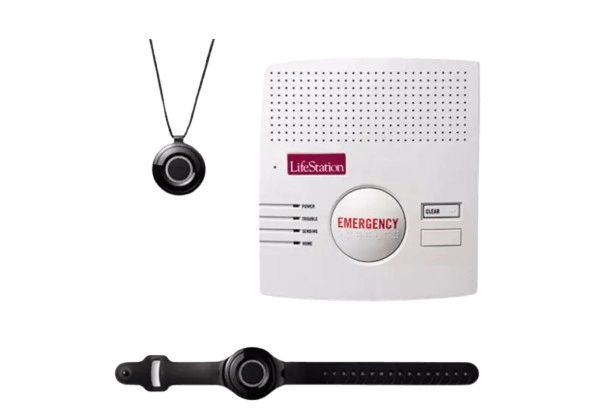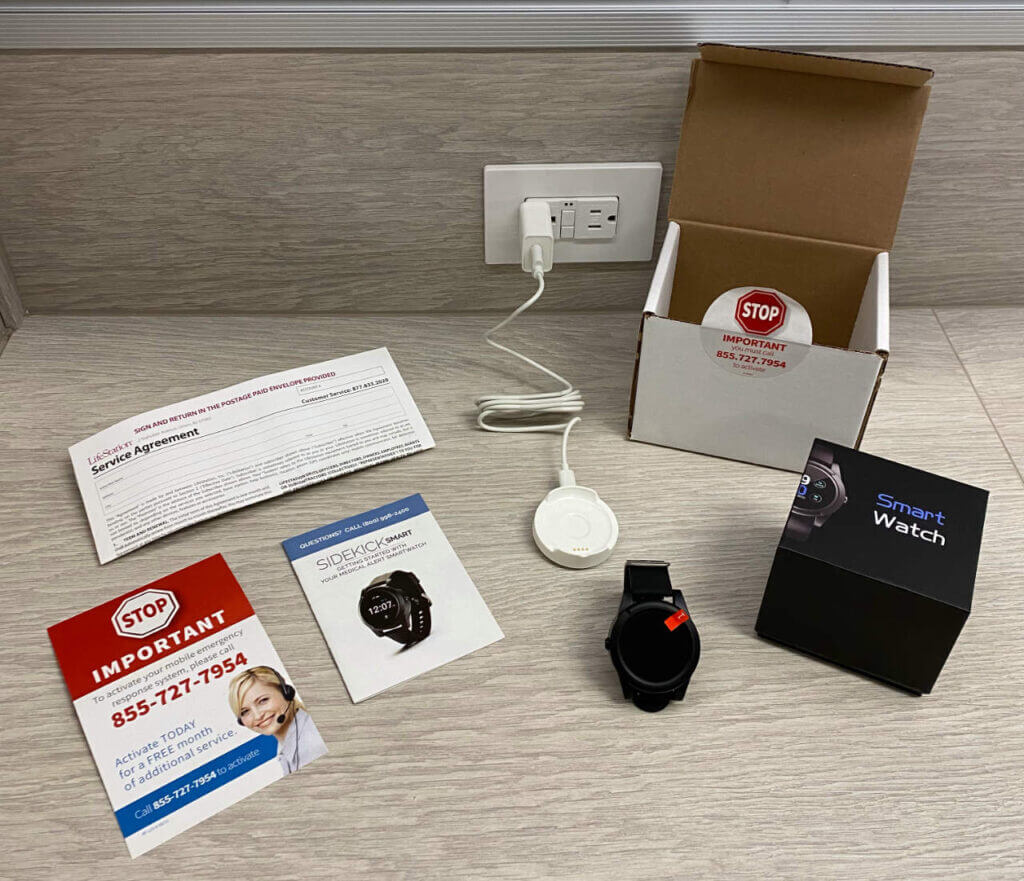

Medical Alerts

Average Cost: $25 - $45
Here’s an in-depth review of LifeStation, including its products, pricing, customer experience, and how it compares to other medical alert providers.
Our Verdict: LifeStation is a dependable choice for seniors who value fast response times and straightforward pricing. It’s especially strong in customer service and easy setup, though it may lack some of the advanced smart-home features offered by newer brands.
Founded in 1977, LifeStation is one of the most established names in the medical alert industry. Headquartered in New Jersey, the company provides nationwide coverage and monitoring through its two U.S.-based, UL-listed response centers. LifeStation’s mission is to help older adults live independently and confidently while ensuring peace of mind for their loved ones.
LifeStation offers both at-home and on-the-go medical alert systems, including options with GPS, fall detection, and voice activation. Its systems are compatible with both landline and cellular connections, making them accessible for a wide range of households.
| Best For | Top Model | Cost Installed | Standout Feature | Warranty |
|---|---|---|---|---|
| Seniors seeking reliable 24/7 monitoring | Mobile LTE with GPS & Fall Detection | $25 to $45 per month | Rapid response time with in-house monitoring centers | Lifetime equipment warranty |
At Modernize, we appreciate how LifeStation focuses on simplicity and service. The company’s systems are easy to install — most devices come ready to use right out of the box. We also like that all monitoring is handled in-house, which helps ensure faster response times and consistent service quality.
LifeStation’s MyLife Safety Network adds another layer of protection by notifying caregivers or family members during an emergency. We also value the transparent pricing — no long-term contracts or hidden fees — which makes it easy for families to budget.
Before deciding on a provider, it’s important to weigh the strengths and drawbacks. Here’s what to expect from LifeStation.
Pros
Cons
LifeStation provides several types of medical alert systems designed to support aging in place safely.

All systems include 24/7 monitoring, caregiver alerts, and access to the MyLife Safety Network app for family members.
| Product | Features | Best For | Cost |
|---|---|---|---|
| At-Home Traditional System | Landline-based, waterproof button, 600-ft range | Homebodies who don’t need mobile coverage | $25/month |
| At-Home Cellular System | Works without landline, optional fall detection | Users without a home phone line | $30/month |
| Mobile LTE System | GPS, cellular coverage, optional fall detection | Active users who travel or go outdoors | $35/month |
| Luxury Pendant | Discreet design, built-in mic and speaker | Style-conscious users who prefer wearable comfort | $45/month |
Customer feedback for LifeStation is largely positive, with most users praising its fast response times, helpful representatives, and easy setup process. The company holds an A+ rating with the Better Business Bureau and has earned strong marks for reliability and customer care.
That said, some customers have reported billing concerns or challenges when returning equipment, which are worth keeping in mind when reviewing contract terms. These reviews don’t represent the majority of user experiences but serve as a helpful reminder to read the fine print and ask questions before subscribing.
“Got the service for my parents. They love it. It gives me the peace of mind that they are protected in the event of an emergency and allows them to continue to live in their home. I did get the optional fall detection, which I find helpful.” — ConsumerAffairs Review
“Have had the service for years. They have always been there whenever my parents have needed assistance.” — BBB Review
“What made my experience great was the customer service the agent was very helpful and knowledgeable he answered all my questions truthfully” — Trustpilot Review
LifeStation’s medical alert systems are affordable and transparent, with prices starting around $25 per month and ranging up to $45 per month depending on the model and features. Equipment is included at no extra cost, and users can cancel anytime without penalty.
| System Type | Monthly Cost | Activation Fee | Fall Detection | GPS |
|---|---|---|---|---|
| At-Home (Landline) | $25 | $0 | +$5 | No |
| At-Home (Cellular) | $30 | $0 | +$5 | No |
| Mobile LTE | $35 | $0 | +$5 | Yes |
| Luxury Pendant | $45 | $0 | Included | Yes |
LifeStation offers monthly and annual payment plans, with a discount for prepaying annually. There are no long-term contracts, and customers can cancel anytime for a prorated refund.
LifeStation competes with top medical alert brands like Bay Alarm Medical and Medical Guardian. While it may not offer smartwatch integrations or advanced mobile apps, it stands out for affordability, reliability, and responsive customer care.
| Provider | Monthly Cost Range | Monitoring Type | Key Feature | Contract Required |
|---|---|---|---|---|
| LifeStation | $25 to $45 | In-house U.S. monitoring, landline or cellular | MyLife Safety Network caregiver alerts | No |
| Bay Alarm Medical | $25 to $40 | U.S.-based centers, landline or cellular | Smartwatch and car help button options | Optional |
| Medical Guardian | $30 to $55 | U.S.-based centers, cellular and GPS | Mobile app and smartwatch compatibility | No |
| Medical Alert | $28 to $50 | U.S.-based centers, landline or cellular | Free spouse coverage on select plans | Optional |
Choosing the right medical alert system can bring peace of mind to both seniors and their families. To help you make an informed decision, we’ve answered some of the most common questions about LifeStation’s equipment, pricing, and monitoring services below. Whether you’re comparing systems or setting up your first device, these insights can help you understand what to expect.

When you press your LifeStation button, you’re immediately connected to a trained operator at one of the company’s 24/7 monitoring centers. The operator will assess the situation, contact emergency services if needed, and notify your emergency contacts.
No. LifeStation offers both landline and cellular options. The mobile LTE system connects through a nationwide cellular network, so you don’t need a home phone line.
LifeStation’s fall detection uses motion sensors to identify sudden movement changes. While highly accurate, no technology can detect 100% of falls, so it’s best used as an added safeguard.
Yes. Through the MyLife Safety Network, caregivers and family members can receive instant notifications during an emergency.
No contracts are required, and you can cancel anytime. LifeStation even offers a 30-day money-back guarantee.
LifeStation is a solid, affordable choice for seniors and families seeking a reliable medical alert system with great customer support. It’s best for users who value simple equipment and responsive service over tech-heavy extras.
If you’re looking for an easy-to-use, dependable option with no hidden costs, LifeStation is an excellent fit.
Read real homeowner reviews, explore qualifications, and view promotions. Modernize makes it easy to browse professionals and find one that will be perfect for your project.